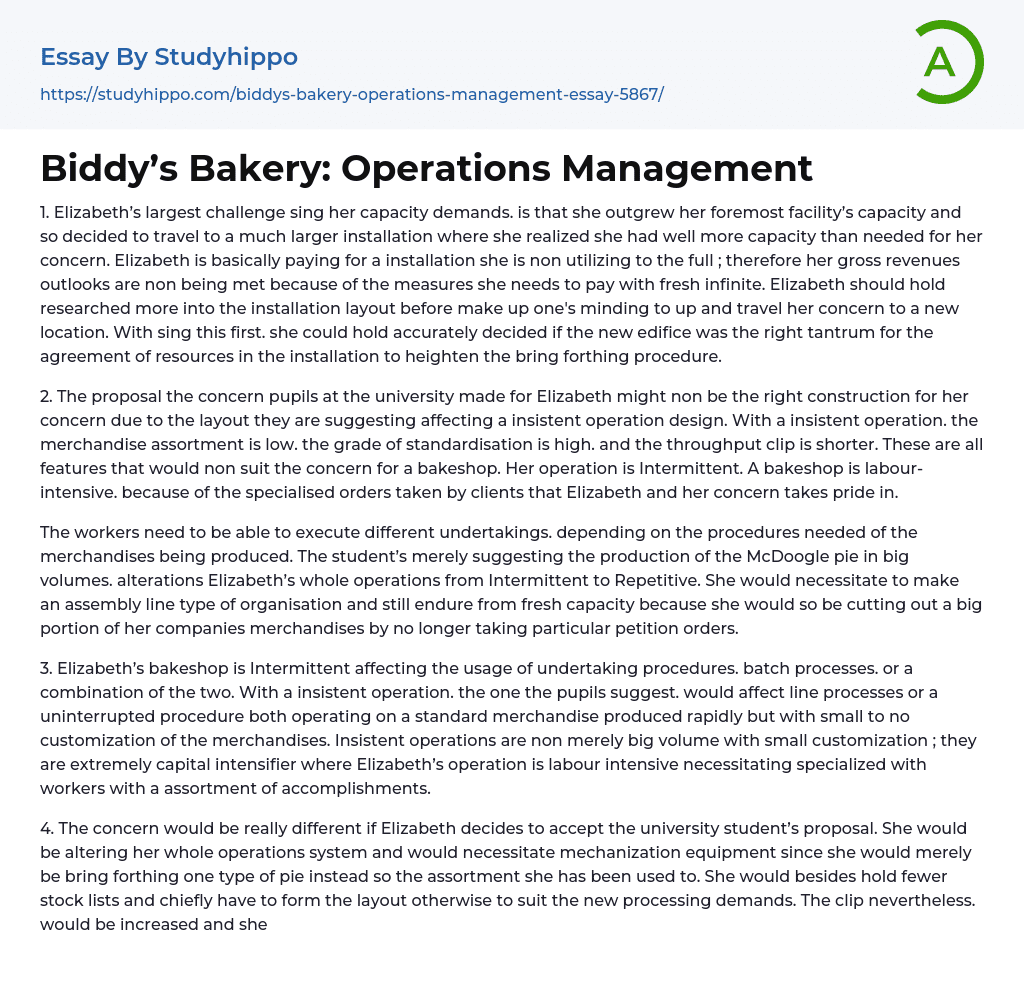1. Elizabeth's main challenge is that she has outgrown her current facility's capacity and decided to move to a larger location. However, she now realizes that she has more capacity than necessary for her business. This means she is paying for unused space and not meeting her sales expectations due to additional expenses. It would have been beneficial for Elizabeth to research the new facility's layout beforehand to determine if it would enhance her production process and fulfill her resource requirements.
2. The proposed structure by the business students may not be suitable for Elizabeth's bakery business due to its repetitive operation design. Repetitive operations are characterized by low product variety, high standardization, and shorter throughput time. These characteristics do not align with the nature of a bakery operation, which is labor-intensive and focuses on specialized customer orders. Workers in a ba
...kery need to perform various tasks based on the specific product being produced.The suggestion made by the student is to produce the McDoogle pie in large quantities, which would require Elizabeth to change her current intermittent operations to a repetitive one. This would involve organizing the bakery as an assembly line and reducing the number of special order requests. Elizabeth's bakery currently uses intermittent operations, which involve batch processes or a combination of both. The student suggests a repetitive operation, which would involve continuous processes or a standard product that is produced quickly with little customization. Repetitive operations are not only high volume with minimal customization, but also require a significant amount of capital investment. In contrast, Elizabeth's operation is labor-intensive and requires skilled workers with various skills. If Elizabeth decides to accept the student'
proposal, her business would undergo significant changes. She would need to invest in mechanized equipment since she would only be producing one type of pie instead of a variety. Additionally, she would have fewer inventories and would need to reorganize the layout to accommodate the new processing requirements. However, the time it takes to make this transition is not mentioned.Increasing sales would be possible and she might see an increase in revenue. The original mission of her business was to produce a variety of baked goods with antique style and flavor. By accepting a repetitive design, her mission statement would not be changed. I would primarily suggest keeping an intermittent design in the new building because Elizabeth's business requires a variety of unique qualities that are not available with mass production. By accepting the student proposal and having her pies sold in a store, she would be competing on a larger scale, particularly in terms of price, which is unfamiliar to her. With customization, she can maintain relatively high prices. Elizabeth may need to hire more skilled workers in order to expedite her baking process and deliver her baked goods to her customers more quickly. It is not completely out of the question for her to focus more on the McDoodle pie in the new building. Elizabeth could have both an intermittent and repetitive structure by purchasing some automation to help speed up certain processes while keeping the layout design in the building separate. Since most of her sales come from that pie, a larger percentage of focus can be placed on it. Flexible Manufacturing Systems (FMS) is a way for Elizabeth to have an
automated system while still combining the flexibility that her intermittent operation offers.Elizabeth can maintain the efficiency of uninterrupted operations by combining engineering with her workstation grouping technique. This can help speed up her procedures and ensure that her assortment of baked goods is well-maintained, ultimately increasing sales and maximizing Elizabeth's productivity without the need for additional space.
- Leadership and Management essays
- Change Management essays
- Project Management essays
- Knowledge Management essays
- Operations Management essays
- Quality Management essays
- Risk Management essays
- Scientific Management essays
- supply chain management essays
- Performance Management essays
- Time Management essays
- Brand Management essays
- Total Quality Management essays
- Risk essays
- Manager essays
- Leadership essays
- Business Ethics essays
- Board Of Directors essays
- Product Management essays
- Comparative Analysis essays
- Decision Making essays
- Dispute Resolution essays
- Stress Management essays
- Business Management essays
- Brand Equity essays
- Branding essays
- Nike, Inc. essays
- Market share essays
- Razor essays
- Being A Leader essays
- Servant Leadership essays
- Leadership Experience essays
- Leadership Qualities essays
- Incentive essays
- Accounting essays
- Andrew Carnegie essays
- Automation essays
- Business Cycle essays
- Business Intelligence essays
- Business Model essays
- Business Operations essays
- Business Software essays
- Cooperation essays
- Cooperative essays
- Corporate Social Responsibility essays
- Corporation essays
- Customer Relationship Management essays
- Family Business essays
- Franchising essays
- Harvard Business School essays




